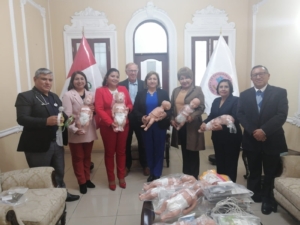A Month of Thanks: Day 2 – Babies
We love babies. We’re thankful for the impact the Newborn Resuscitation Train-the-Trainer Program is having on saving lives in Perú.

Dr. Bob Gehringer and Dr. Roberto Tarazona meet with the leadership of the Peruvian College of Nurses to expand the NRTP train-the-trainer program.
It was November 2019 when Lic. Catherine Tejada Aguirre was in the high mountain city of Pasco in the Peruvian Andes, holding a newborn in her arms. The baby was in a poor state, with an Apgar score of only 4 out of 10. Baby Luz (not the childs real name) had a limp body with a bluish appearance, a low pulse rate, and barely any response to simulation. Her situation is similar to 10% of babies born in homes and health centers across the country.
While progress has been made and neonatal mortality rate in Perú has fallen from 16 deaths per 1,000 live births (2000) to only 6 (2019), the rate in rural and underserved regions still lag behind. In these areas — home to almost half the country’s entire population — around 75% of women give birth at home alone or in small clinics with only a single healthcare professional because they do not have the same access to health services as those in urban areas.
Working with local organizations, communities, and government units since 2014, we at Health Bridges International have learned that the country’s healthcare system has yet to standardize training for medical professionals in neonatal resuscitation. Healthcare professionals in Perú need support to consistently develop crucial skills in neonatal care.
The three other medical professionals in the room attempted resuscitation efforts for Baby Luz. They went through several attempts but Baby Luz showed no signs of improvement. The services of a certified neonatal resuscitation specialist was needed.
Without hesitation, Lic. Catherine, a neonatal resuscitation trainer, stepped up to help resuscitate Baby Luz. She led her colleagues through the steps in providing warmth, clearing the airway, drying, and stimulating Baby Luz. With her assistance, Baby Luz’s condition improved. They applied positive pressure ventilation and Baby Luz spontaneously started to breathe. Within an hour, Baby Luz was well and breastfeeding. “What I learned in this [NRTP] course gave me a solid understanding to perform resuscitation and to be able to save lives,” says Lic. Catherine.
To provide medical and health professionals critical support, we sought to create and replicate a newborn resuscitation training and teaching model. Under the direction of HBI’s Medical Director, Dr. Bob Gehringer, and co-developed with the Perúvian College of Midwives, the HBI Neonatal Resuscitation Train-the-Trainer Program (HBI NRTP) is an official certification program that trains midwives to provide contextualized training to colleagues in their own communities. The program creates a powerful multiplier effect: since 2014 with over 130 trainers trained in 246 regions, more than 20,600 participants have received neonatal resuscitation training and an estimated 5,200 babies per year have been saved. We support our partner’s leadership in ensuring that this certification becomes part of future licensure requirements for all midwives in Perú.


Leave a Reply
Want to join the discussion?Feel free to contribute!